Dementia And Symptom
Dementia is a syndrome associated with an on-going decline of the brain and its abilities due to gradual damage to the brain. Dementia is a general term for a decline in mental ability that associated with a decline in memory or others thinking skills and can interfere in basic daily life function.
The symptoms of dementia are:
- Decreased cognitive function such as forgetfulness, decline in thinking, language and ability to get and analyse information.
- Confusion about person, time and place.
- Personality changes.
- Withdrawal or avoid to participate in group activity.
- Withdrawal from taking part in everyday activities.
Functional Activity For Individual With Dementia
Each individual with dementia have specific symptom that may difference with others. They gradually need more helps in their daily routine especially in basic activity of daily living. Activities of daily living (ADLs) are the self-care tasks during daily lives. These tasks include mobility, dressing, feeding, and toileting activity.
Individual with dementia gradually begin to think less clearly and can be easily confused, especially with new tasks, people, and places. This inability for self-care is a common reason why they seek help from others. Caregivers must learn how to help with ADLs to enhance their quality of life.
There are many different ways that can help individual with dementia to maintain or improve independency level in daily living. Aids that support to remains safe can help them for better quality of life.
It is important that assistive device is always used for the right reasons. It should be primarily for the benefit of the person with dementia – to enhance their independence, safety and daily living.
Mobility Activity
Mobility aid is chosen depending on the severity of physical motor, balance and coordination skills.
There are variety types of mobility aids. It depends on the symptom and severity level of the patient.
- Walking cane – To facilitate walking.
- Walking frame – Support to stabilize patient to walk and prevent from fall.
- Wheelchair – Help the individual with severe motor problem and have high risk of fall especially outside the home.
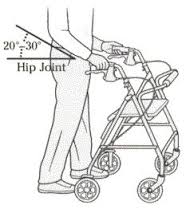 |
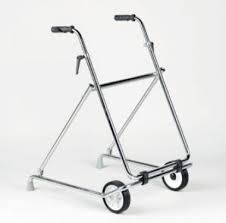 |
Tips for carer:
- Ensure good lighting. Its can help to prevent trips and falls.
- Used proper and comfortable footwear.
- Chair with arm rest also can make them easier to stand from sitting position.
- Plan journey trip. Reassure the person aware about surroundings, distance and walking pathway.
- Safe walking activity. Handrails and signposting can make it easier for them to find their way.
- Sensor (alarm/light) – can be placed by the bed and can be used to activate a light or alarm when the person gets up in the night. It also can help to alert someone to assist them. For example, to assist them to the toilet.
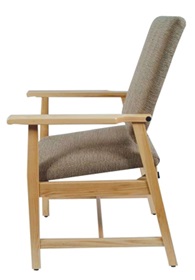 |
| Chair with arm rest |
Dressing Activity
Dressing activity is important for everybody. It’s a very personal and private activity which always used to decide by own decisions. Independence in dressing activity will improve the self-confidence and help reducing the emotional disturbance.
| STAGE OF DEMENTIA | LEVEL OF ASSISTANCE |
| Mild |
|
| Moderate |
|
| Severe |
|
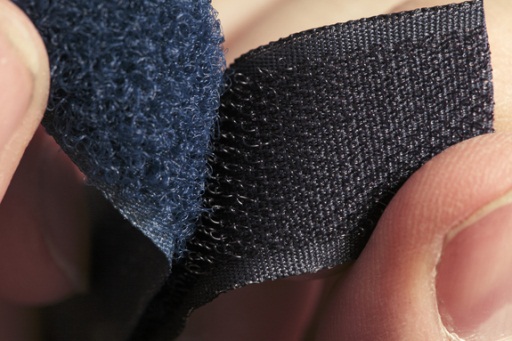 |
| Velcro Closures |
Tips for carer:
- Give the person choice in what they wear, but too many options can be confusing, eg choice of only two options.
- Give instructions in very small steps, and used labels or pictures.
- Allow enough time.
- Help the person stay comfortable. Ensure that the lighting levels are suitable, provide a suitable chair with arms if the person has poor balance.
- Privacy is important.Ask the person if they would like to go to the toilet before getting dressed.
Feeding Activity
As dementia progresses, individual with dementia’s concentration and co-ordination decrease and they need more help in feeding activity. It’s important that they are able to carry out feeding activity as long as possible. There are variety types of feeding aids. It depends on the patient limitation and severity level of the patient.
| STAGE OF DEMENTIA | LEVEL OF ASSISTANCE |
| Mild |
|
| Moderate |
|
| Severe |
|
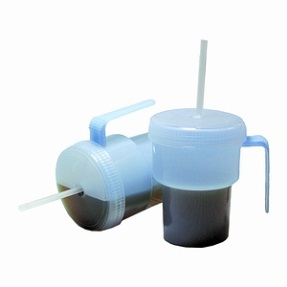 |
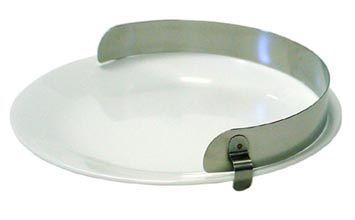 |
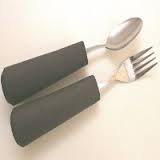 |
| Spill-proof cups | Plate guard | Enlarged feeding utensils |
Tips for carer:
- Encourage the person to get involved at mealtimes. They could help prepare the food or lay the table.
- Make sure the vision is clear to recognise food and drink.
- Make food look and smell appealing can stimulate someone’s appetite. Use different tastes, colours and smells.
- If the person is having difficulties chewing or swallowing, try naturally soft food, before considering pureed food. If a person is having difficulty with swallowing, a referral to a doctor or speech therapist can help.
- Positive encouragement and gentle reminders to eat, may help.
- A relaxed, friendly atmosphere with some soft music may help for the least stressful solutions.
- The color of the food, plates and tables should be different. Avoid patterned plates to reduce confusion.
- Try not to worry about mess; it’s more important for the person to eat than to be tidy.
Toileting Activity
Difficulties with using the toilet, accidents and incontinence can all be problems for individual with dementia, particularly as the condition progresses. These problems can be upsetting for the person and for those around them. The following ideas may help to use the toilet more easily.
| STAGE OF DEMENTIA | LEVEL OF ASSISTANCE |
| Mild |
|
| Moderate |
|
| Severe |
|
Tips for carer:
- A bright and clear sign (e.g. word / picture) on the toilet door to help the person identify the location of the toilet. Leaving the toilet door open when not in use makes this obvious.
- Movement sensor lights in the bedroom and bathroom can help the person make their way easily to the toilet especially at night.
- Help the person undo, remove and replace clothing easily. Trousers with an elasticated waist are often easier than zips.
- Aids such as handrails and a raised toilet seat for people with mobility problems.
- If getting to the toilet becomes too difficult because of mobility problems, an aid such as a commode may be useful.
- The person should have privacy in the toilet, but make sure they don’t have difficulty managing locks and ensure you can open them quickly from the outside.
The benefit of tips of daily activity
- Promote independence and autonomy
- Improve confidence and quality of life for a person with dementia.
- Help manage potential risks in and around with dementia
- Help with memory and recall.
- Support a person with dementia to maintain some abilities
- Provide reassurance to carers and help them to feel less stressed.
Home Activity
| Type of activity | Mild | Moderate | Severe |
| Art/Music | Take photos, paste photos in an album, draw, finger paint, play an instrument | Take photos, arrange flowers, sing along with others | View photos, listen to music, sing along to familiar songs |
| Word games, card games, video game | Word searches, crossword puzzles, card games, Internet games | Word searches with focus on one topic, simple computer games | Discuss a simple topic, listen to others |
| Sewing | With stand-by assist | Supervise—give resident one task to complete at a time | Sewing cards, activity blankets or aprons with buttons, snaps, ties, Velcro, and zippers |
| Crafts | Knitting or crochet using large needles and bulky yarn | Choose colors, roll balls of yarn | Choose colors, use the items that are created |
| Shopping | Go along to store, help with purchasing decisions, help put groceries away | Go along to store, use electric cart in store | Sit in car with supervision |
*Speak to an occupational therapist about aids that can help.
Reference
- Living with Dementia. September 9, 2015, from http://www.alzheimers.org.uk
- About dementia. September 7, 2015, from http://www.nsh.uk
- Assistive technology – devices to help with everyday living, September 10, 2015, http://www.alzheimers.org.uk
| Last Reviewed | : | 28 August 2020 |
| Writer/ Translator | : | Zakiah bt. Zakaria |
| Accreditor | : | Rokiah bt. Alias |
| Reviewer | : | Tan Foo Lan |







